Wallet & DEX: Where Regulators and Hustlers Meet
1. INTRO
In the fast-paced world of cryptocurrencies, wallets are more than just a tool; they are the gateway to the decentralized web, a place where security meets convenience. As we navigate through the intricate landscape of DeFi wallets and dApps, it becomes essential to pause and understand the currents that are shaping this dynamic space.
Taking cues from a deep dive presented on ax1.vc, we find ourselves pondering the burgeoning potential of Trust Wallet. It’s not just about the technology; it’s about strategic moves, partnerships and a teem with a vision. Since the release of our previous research, the waters have surged even further, reaching a pivotal moment where Telegram has embarked on transforming its messenger service, already a staple for 800 million users, into a full-fledged Web3 wallet. This monumental stride by Telegram is a testament to the ceaseless innovations in wallets field.
In this exploration, we will stitch together insights from various corners of the crypto world to present a tapestry that tells the story of the present and forecasts the future. From market analyses to regulatory landscapes, we aim to provide a rounded view, grounded in data and elevated by understanding.
2. CURRENT STATE OF THE CRYPTO WALLET MARKET
The crypto sphere is abuzz with potential and a race is clearly underway. The ceiling for Monthly Active Users (MAU) of centralized crypto exchanges (CEX) is currently pegged at 35 million, a figure that Web3 wallets are steadily approaching with a user base of 20 million. The spotlight is now on major players like Trust Wallet, Coinbase Wallet, MetaMask, and Worldcoin, as we eagerly anticipate which among them will revolutionize the user experience by introducing a super user-friendly Smart Wallet functionality.
At present, these platforms attract between 500,000 to 2 million users monthly. However, a considerable number of these newcomers drift away without engaging in a single transaction. The reason? A system steeped in outdated practices, including cumbersome seed phrases, prolonged wallet creation times and the absence of a first free transaction, among others.
The Rise of Smart Wallets
The industry is on the cusp of a transformation, with the introduction of Smart Wallets being hinted at by notable figures such as Vitalik Buterin. This innovation promises to streamline even the most basic transactions, setting the stage for a Web3 economy ready to scale like never before.
As we delve deeper, we find that the Smart Wallet stands as a beacon of hope, promising to eradicate the hurdles of the existing system. It aims to offer a user experience that is not just dressed up on the surface but is fundamentally user-friendly, setting a pathway for a Web3 economy that is poised for unprecedented scaling.
Trust Wallet emerges as a strong contender in this race, backed by the nurturing guidance of Binance and fueled by a vision that transcends technology. It embodies the spirit of innovation, aiming to seize the opportunities that lie in the evolving landscape.
3. MARKET ANALYSIS AND STATISTICS
In this section, we delve into a meticulous analysis of the current market dynamics, drawing from a rich pool of data to understand the trends that are shaping the crypto wallet landscape.
Wallet Downloads Forecast
As we analyze the MAU of each app, we find it pertinent to delve into the trends governing app downloads across different markets. Taking Binance app as a reference point, we observe the ongoing transition from CEX to DEX. While the CEX continues to hold ground, a significant surge in DEX is anticipated starting Q4 2023, propelled by regulatory shifts and a low base effect for wallets in certain markets. In an optimistic scenario, Trust Wallet’s quarterly installations could potentially surpass those of the Binance app by Q2-Q3 2024.
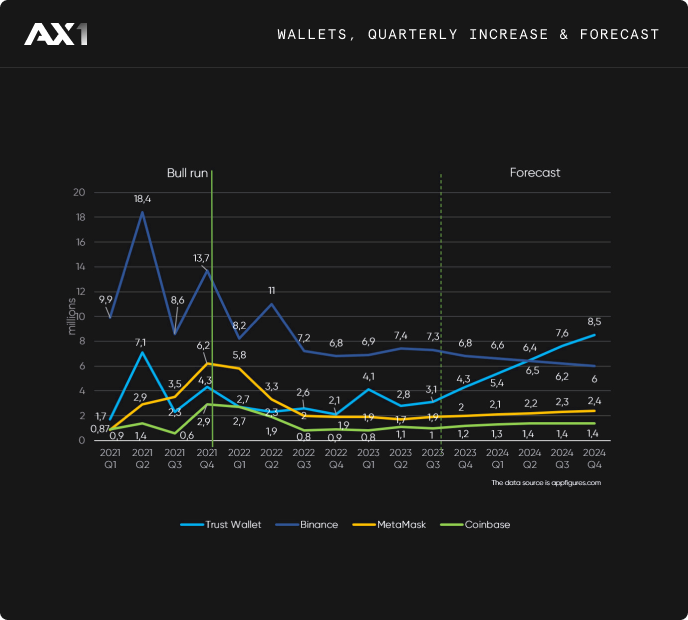
Global App Downloads
By the end of 2023, Binance is projected to amass 120 million downloads globally. Meanwhile, Trust Wallet continues on an upward trajectory, showcasing sustained growth.
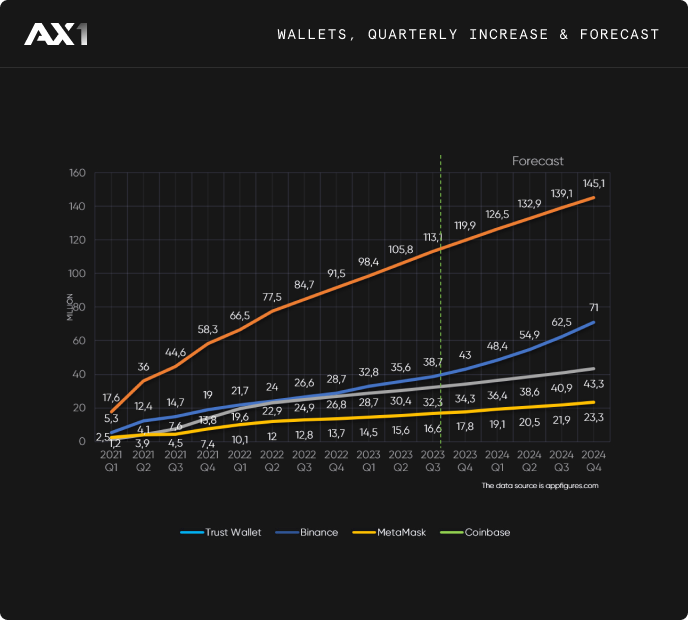
Country Breakdown
Taking a closer look at emerging economies, we undertake a deep dive to understand the crypto adoption trends in these regions. South and Southeast Asia emerge as significant players, aligning closely with the US in terms of adoption patterns.
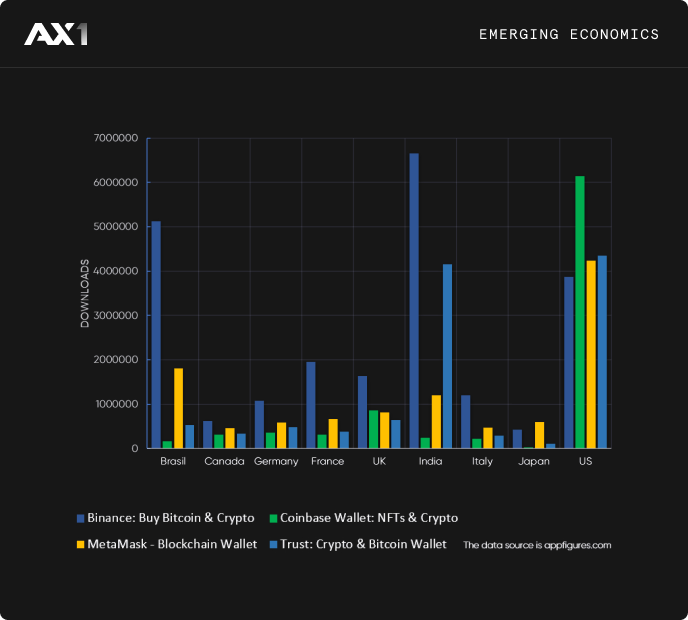
Market Size
The market size predictable graph will be a pivotal element in this section, illustrating the anticipated trends and providing a roadmap for the foreseeable future.
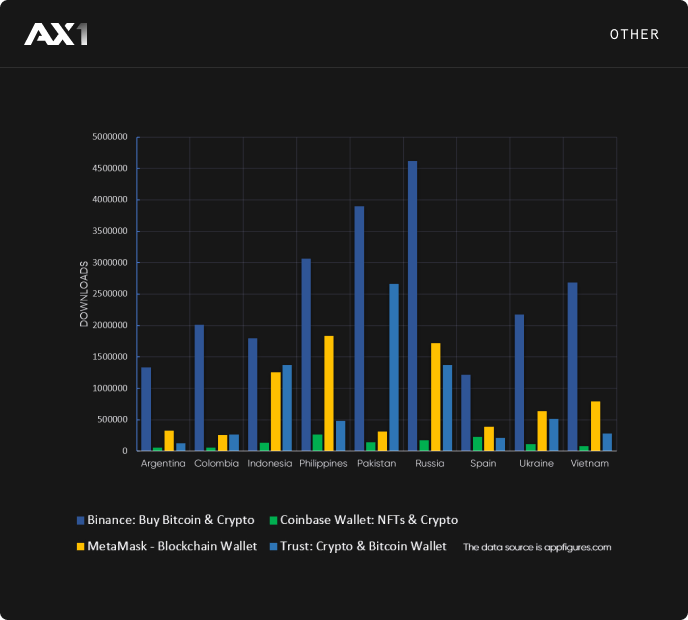
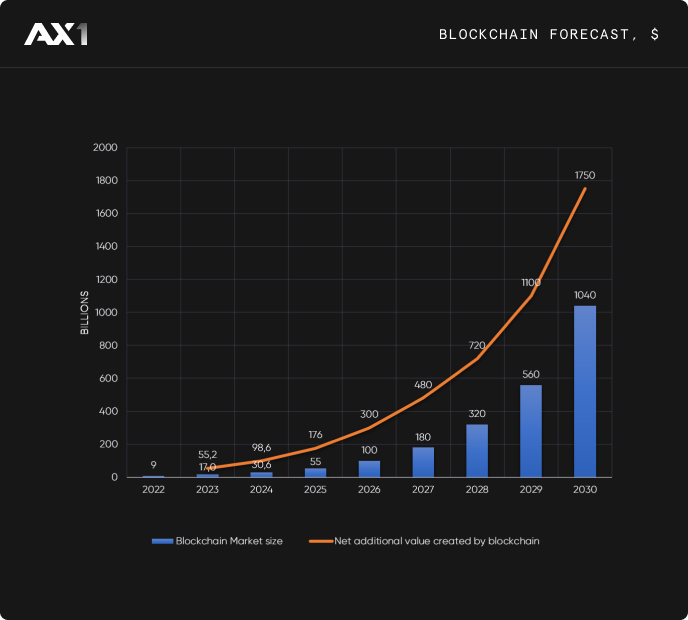
As we sum up the analysis, we note that as of Q2 2023, Trust Wallet boasts over 70 million clients, a figure derived from the official data available on the Trust Wallet site. A significant portion of these downloads, amounting to at least 33 million, are direct APK downloads from the site, predominantly from the rapidly growing Chinese market.
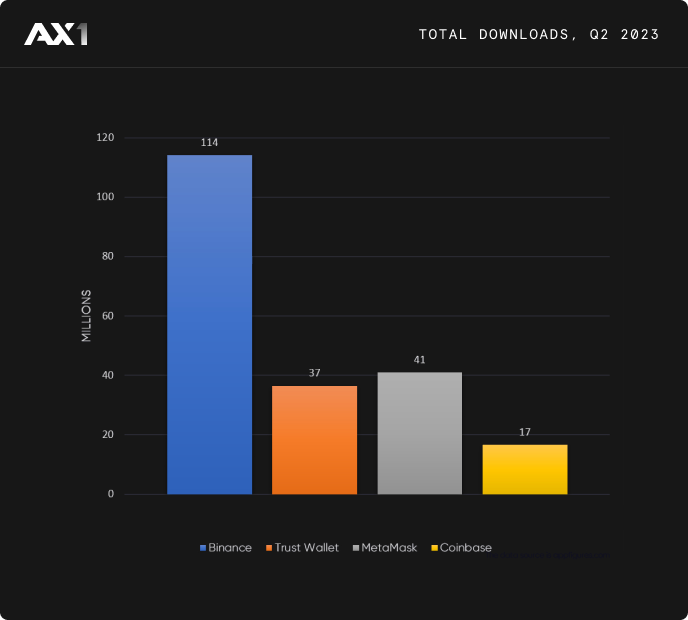
4. REGULATORY LANDSCAPE FOR DEFI, DAPPS AND NON-CUSTODIAL WALLETS
United States
In the US, the regulatory authorities have intensified their scrutiny on the crypto sphere, with a particular focus on DeFi. The Securities and Exchange Commission (SEC) has asserted that numerous DeFi products fall under the category of securities, bringing them within the ambit of its regulatory oversight. This perspective has led the SEC to initiate enforcement actions against several DeFi initiatives believed to have breached securities legislations.
Parallelly, the Commodity Futures Trading Commission (CFTC) has been proactive in delineating its role in the DeFi sector. Given its jurisdiction over derivatives, the CFTC has identified certain DeFi products as derivatives, thereby subjecting them to its regulations. This stance has been followed by the issuance of guidelines on DeFi regulation and the initiation of enforcement actions against projects perceived to have violated commodities laws.
Adding another layer to the regulatory landscape is the involvement of the Financial Crimes Enforcement Network (FinCEN). Tasked with enforcing anti-money laundering (AML) laws, FinCEN has turned its attention to the potential use of DeFi products in money laundering activities. This has led to the release of regulatory guidelines and the commencement of enforcement actions against projects suspected of AML law violations.
As we delve deeper into the recent developments affecting DeFi and dApps, it is pertinent to note that we have previously discussed some of these considerations and the associated risks, including CEX-related SEC litigations, in our earlier articles. It is time to dive into the most recent developments that specifically affect DeFi and dApps.
1. Treasury and IRS Proposed Regulations on Crypto Tax Reporting
Background
The IRS initiated its guidance on digital assets back in 2014, categorizing cryptocurrency as property for U.S. federal income tax purposes through Notice 2014-21. This guidance evolved with Revenue Ruling 2019-24 in 2019, addressing hard forks, and further in July 2023, clarifying the tax implications of staking cryptocurrency rewards. The IRS has been consistently updating a FAQ section on its website since 2019 to address cryptocurrency transactions.
Recent Developments
Recently, a new set of proposed regulations targeting tax reporting requirements for digital asset brokers has been unveiled. This rule mandates a wide array of entities, including DeFi protocols and wallet software providers, to gather and report user details such as names, home addresses, and wallet addresses for all user transactions. This proposal has faced substantial backlash from the industry, criticized for being overly expansive and potentially hindering innovation in the DeFi sector.
a) Potential Impact
Potentially making operations nearly unfeasible for U.S. founders and users. Here we outline the potential repercussions for various stakeholders:
- Wallet Software Providers: Obliged to report user information for all transactions facilitated through their software, a requirement seen as a substantial compliance burden and a breach of user privacy.
- DeFi Protocols: Required to report user details for all platform transactions, a move criticized for undermining the principles of decentralization and anonymity that are central to DeFi.
- Digital Asset Exchanges: While exempt from reporting on-platform transactions, they would be required to report off-exchange transactions, such as peer-to-peer trades, a stipulation viewed as burdensome and invasive.
b) Flaws in the Proposed Regulations
The proposed regulations have been pinpointed for several perceived flaws, including:
- Overly Broad Definition of “Broker”: The current definition encompasses anyone facilitating digital asset sales and having potential access to party identities, a change seen as an attempt to indiscriminately label various entities as brokers.
- Burdensome Requirements: The rule is criticized for imposing a significant burden on many entities, particularly small businesses and startups, potentially forcing them out of the U.S. market.
- Stifling Innovation: The DeFi space, known for its permissionless and decentralized nature, could see its core principles undermined by the new reporting requirements.
Despite the criticisms, there is a silver lining as these regulations are still in the proposal stage, leaving room for revisions and amendments. The industry advocates for a more nuanced definition of “broker” and seeks exemptions for DeFi protocols from the reporting requirements.
Currently open for public commentary, the rule is slated to be enforced in 2025, affecting the tax season of 2026. The crypto industry is rallying for congressional intervention to ensure a fair and balanced rule. Senators Ron Wyden and Mike Crapo are spearheading this initiative, seeking insights from the Treasury Department and the IRS to understand the nuances of crypto tax issues better.
As the industry works tirelessly to educate policymakers on the potential ramifications of the rule, it is also developing tools and best practices to aid entities in compliance, should the rule be finalized in its existing form. The road ahead seems to be paved with debates and potential litigations, with the overarching fear that the U.S. may alienate the burgeoning DeFi sector.
2. The CFTC’s Enforcement Actions Against DeFi
On September 7, 2023, the CFTC initiated three enforcement actions against DeFi protocols: ZeroEx Labs, Opyn, and Deridex, marking a significant turn in the regulatory landscape for DeFi in the United States.
Charges Against Individual Protocols:
- ZeroEx Labs: Accused of violating the Commodity Exchange Act (CEA) by facilitating leveraged token trading without registering as a futures commission merchant (FCM) with the CFTC.
- Opyn: Charged with developing a blockchain-based trading protocol for its digital asset derivative token, oSQTH, without proper registration, and allowing leveraged transactions without implementing a mandatory customer identification program.
- Deridex: Allegedly offered derivatives through perpetual swaps without the necessary registration. Perpetual swaps resemble futures contracts but lack an expiration date.
- Ooki DAO: Settled charges of offering margined and leveraged commodities without admitting or denying the allegations, a case notable for the formal notification of the action through Ooki’s online chatbot and Discord.
3. Tornado Cash
Tornado Cash is a decentralized application (dApp) that facilitates the mixing of cryptocurrency transactions to enhance privacy. However, its functionality has raised serious concerns, leading to unprecedented legal actions and sanctions.
OFAC’s Sanction on Tornado Cash
In August 2022, the Office of Foreign Assets Control (OFAC) sanctioned Tornado Cash following its utilization by the Lazarus Group, a North Korean hacking entity, to launder substantial amounts of stolen cryptocurrency. This move, marking the first instance of a software being sanctioned, has ignited widespread debate and controversy.
Recent Developments
August 23, 2023: Co-founders Sanctioned
Roman Semenov and Roman Storm
Sanctioned by: OFAC, in collaboration with the U.S. Department of Justice (DOJ).
Charges: Allegedly aware of the Lazarus Group using Tornado Cash for money laundering but continued to develop and promote the dApp without taking measures to prevent illicit usage.
Impact: U.S. individuals are prohibited from transacting with them or their assets, emphasizing the necessity for due diligence in the virtual currency ecosystem.
Alexey Pertsev
Arrested by: Dutch law enforcement authorities in August 2022.
Charges: Related to money laundering activities.
Roman Storm
Arrested in: The United States.
Charges: Conspiracy to commit money laundering, operating an unlicensed money transmitting business, and violating sanctions.
Significance: The arrest underscores the U.S. government’s readiness to impose criminal liability on developers and operators, even if they have relinquished control over the technology and irrespective of the original intention behind the technology.
- Precedential Nature: The sanctions mark a first in targeting a software, raising questions on the extent of regulatory oversight and its implications on the tech industry.
- Due Diligence: The sanctions emphasize the critical role of due diligence for businesses operating in the virtual currency space, warning of potential sanctions for non-compliance.
- Criminal Liability: The arrest of Storm indicates a stern stance by the U.S. government, suggesting that relinquishing control over technology does not absolve individuals from potential criminal liabilities.
The unfolding scenario around Tornado Cash paints a cautionary tale for dApp developers and operators, emphasizing stringent regulatory compliance and due diligence to avert legal repercussions. As the industry navigates this complex landscape, the actions against Tornado Cash and its co-founders stand as a testament to the evolving regulatory dynamics, with potential far-reaching implications for the decentralized applications space.
4. Uniswap Class Action Litigation
In a landscape where regulatory actions have been predominantly stringent, a recent court ruling has emerged as a beacon of hope for the DeFi industry. On August 29, 2023, the United States District Court for the Southern District of New York dismissed a securities class action against Uniswap, a leading decentralized exchange (DEX).
The Allegations
The plaintiffs accused Uniswap of operating as an unregistered securities exchange and broker-dealer, facilitating the trade of unregistered securities. They anchored their argument on the premise that Uniswap’s contracts were instrumental in the alleged securities violations
Court’s Findings
The court, however, dismissed the allegations, basing its decision on several pivotal findings:
- Uniswap’s contracts are neutral and maintain consistency across all tokens, devoid of any mechanism to determine the security status of a token.
- The alleged securities violations were tied to specific token-related contracts developed by the token issuers, not Uniswap.
- The court likened Uniswap’s contracts to user agreements rather than securities exchanges, emphasizing the non-involvement of Uniswap in determining the nature of assets traded on its platform.
- Uniswap neither holds nor owns the assets traded on its platform, distancing itself from facilitating the transfer of title to those assets.
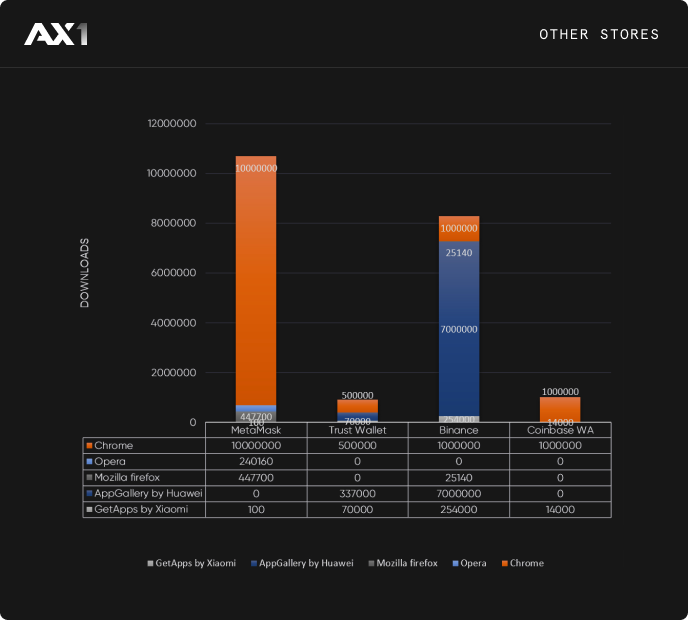
The unfolding scenario around Tornado Cash paints a cautionary tale for dApp developers and operators, emphasizing stringent regulatory compliance and due diligence to avert legal repercussions. As the industry navigates this complex landscape, the actions against Tornado Cash and its co-founders stand as a testament to the evolving regulatory dynamics, with potential far-reaching implications for the decentralized applications space.